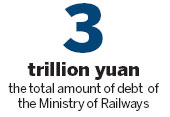Railway reform 'a step forward', but success not guaranteed
Updated: 2013-03-11 07:57The institutional restructuring and functional transformation plan released on Sunday has tolled the bell for the colossal Ministry of Railways, marking the end of the last ministry under the State Council that had both administrative and commercial functions.
Yet, whether the reform will succeed depends on the following measures, which are still unclear, experts said.
|
 |
According to the plan, the ministry's administrative powers will be incorporated into the Ministry of Transport. They include planning railway development, drafting railway technical standards and supervising the railways' operation safety and construction quality.
Meanwhile, the China Railway Corporation will be set up to take over the railway ministry's commercial functions, including organizing railway transportation and construction.
Wang Yiming, deputy head of the Academy of Macroeconomic Research under the National Development and Reform Commission, hailed the move a "landmark".
"It means the country removes the last 'stronghold' in the way of reforming the industry from planned economy to market economy," Wang said. "It will open another door for financing and management of the railway sector."
With some 2 million employees and its own police, court and procuratorate offices, the Ministry of Railways used to be called "a closed empire". It had been in the center of controversy for being both the service provider and watchdog.
In the institutional restructuring in 2008, when the civil aviation administration was incorporated into the Ministry of Transport, the powerful railway ministry had resisted the redistribution of power. Then Railway Minister Liu Zhijun, who is under graft investigation, said the rolled-out high-speed railways needed the ministry intact.
But after nearly 10,000 km of high-speed railways have been laid out in the past five years, Sheng Guangzu, current minister of railways, adopted a different attitude.
|
 |
Sheng told reporters on Sunday that he supported the restructuring and felt no regret over the fact that he would be the last minister of railways.
"What matters is the railway sector will have a better chance of development," Sheng said.
Experts said the move is "a step forward", but many questions remain unanswered.


